News & Events More |
Wartime Conditions, 1914-1918The outbreak of the First World War in August, 1914, served only to make a disastrous situation worse for B.C. fruit growers. The financial recession which had begun the previous year, combined with the largest B.C. fruit crop yet produced, and a similar increase in the American supply, meant that prices plummeted as shippers scrambled to dispose of their fruit on consignment. The manager of the OUG estimated that internal competition in the Okanagan cost the growers between $125,000 and $250,OOO. Heavy American shipments into the Canadian West brought charges of dumping. A resolution at the 1915 B.C.F.G.A. Convention called on the federal government to increase duties on imported apples, "or the industry of British Columbia will not thrive." (The federal government did nearly double the tariff early in 1916, to thirty cents a box. 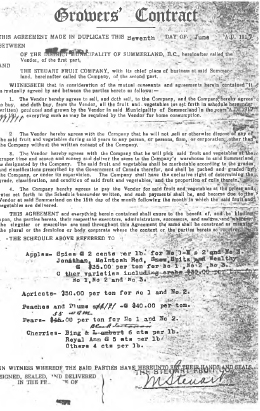
The 1915 B.C.F.G.A. Convention almost did not occur, since the provincial government, strapped for cash by the recession and further pressed by other wartime constraints, curtailed the Association's grant and would not allow payment of delegates' travel and accommodation costs. But the Executive decided to carry on, and the delegates met at their own expense. 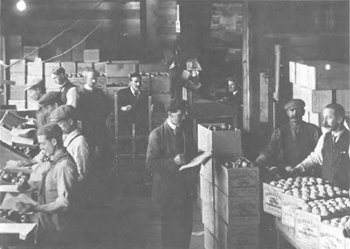
The only bright spot for fruit growers in 1915 seemed to be that the financial turndown had made labour both easier to obtain and cheaper. The Labour Committee reported to the Convention that costs during the past apple harvest were fifteen to twenty per cent down from the year before, and forecast that by the spring of 1915, wages would be thirty per cent lower than in 1913. That situation did not last; the Great War rapidly drained surplus manpower, and much that was not surplus, into the muddy trenches of Flanders and France. This was especially true in the Okanagan, where so many of the fruit growers were recent immigrants from Britain who felt obliged to go "Home" to defend the "Mother Country". By January, 1916, over 200 of the 900 members of the B.C.F.G.A. were carrying arms, and out of a population of about 15,000 in the Okanagan at the outbreak of the War, 1800 men had enlisted. The crop of 1915, although again increased in volume by fifteen per cent from that of 1914, sold much better-apple prices "just about equalled the base cost of production, without allowance for capital costs." But fruitgrowers were becoming alarmed at the shrinkage of the labour force. The 1916 B.C.F.G.A. Convention asked the provincial Department of Agriculture to consider adding instruction in fruit packing to the Manual Training Curriculum in the schools-"and that girls also be given the opportunity of learning the art." The labour shortage grew worse. At the 1917 Convention, the B.C.F.G.A., which had in 1914 called for total exclusion of all Oriental labourers from Canada, passed a resolution asking the provincial and federal governments to remove restrictions on the importation of labour. 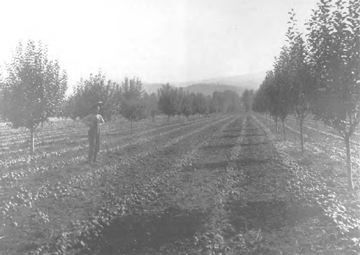
In 1918 the central and contentious issue of the Convention was the proposal put forward to ask the federal government to contract with the Chinese government to import indentured labourers at a set price per head. This turnabout of previous policy brought vigorous opposition from those who felt that it was simply opening the door to the penetration of British Columbia by the "Yellow Peril", who would take over and subjugate the white population to oriental conditions. Proponents argued that sufficient methods of control of the contract labourers could be devised. Lionel Taylor, who had experience in South Africa, explained that in that country a special police force and pass laws had sufficed to control the native and Indian labourers. The proponents argued further that they simply must have the Chinese workers, as the women and schoolchildren who had been mobilized to help in the orchards were unable to do the work, such as weeding the intercrops of onions. This work had been done up to now by the Chinese already in the province, who were now deserting agricultural stoop labour for the high wages available in the lumbermills and the fish canneries. 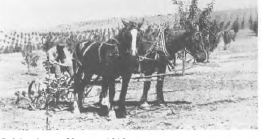
The whole discussion makes the modern observer very uncomfortable; neither proponents nor opponents saw anything unjust in bringing in indentured Chinese to work for one dollar or less per day, when white labour was getting three to four dollars, nor did they see anything wrong in the idea of herding the Chinese like cattle. That this resolution passed is a black mark on the record of the B.C.F.G.A., but it must be seen in the context of the times, when the panderers to mindless prejudice in the popular media had created the myth of the "inscrutable Oriental" scheming to rule the world by displacing sturdy, white workers with innumerable Chinese labourers who required no more than a bowl of rice to subsist. Furthermore, thousands of Chinese indentured workers were taken to France by the Allies, to dig and die in the trenches while their wages were appropriated by a corrupt Chinese government! As soon as the War was over and the supply of white labour was once more available, the B.C.F.G.A. immediately returned to its old policy of opposition to Oriental immigration, once again passing a resolution at the 1919 Convention calling on the government to restrict Oriental ownership of land. Vignette: Soldiers of the SoilBy 1918 the bottomless mud of the trenches of the Western Front in Europe was having a serious effect on the farms of British Columbia, as growers searched for workers to replace those who had gone off to the Forces. 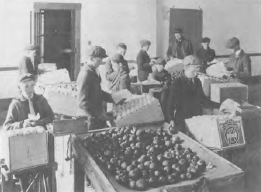
Women replaced men picking and packing apples, Chinese labour was eagerly sought, and on March 4,1918, the Canada Food Board announced the formation of a national organization called "Soldiers of the Soil". The "S.O.S." enlisted boys thirteen to eighteen years old to work on the farms. Many boys left school to work; others started when schools closed for the summer. About two hundred Okanagan boys participated in the program. Some worked part-time, helping plant vacant lots in towns with potatoes, onions, and beans; other worked full-time. William Ruhmann of Vernon, who completed seventh grade that year, was hired as a live-in chore boy at Vernon Orchards, a 250 acre fruit ranch on the east side of Swan Lake. For fifteen dollars a month he was responsible for livestock consisting of two Holstein cows, two horses, and a number of pigs, as well as helping with haying and the fruit harvest. In September he began the eighth grade, handling his duties before and after school, but the schools were closed on October 21 on account of the great influenza epidemic of 1918, so he was once again a full-time labourer until the end of the war. At the 1919 B.C.F.G.A. Convention the Association acknowledged the work of the emergency workers with a resolution "that we wish to place on record our appreciation of the work of the National Service Girls and the S.O.S., who rendered very valuable assistance in the orchards the past season." Meanwhile returns to the growers had improved during the war years. Early in 1917, a serious situation arose when the German U-Boat attacks on shipping caused the British government to place an embargo on the importation of non-essential goods, including fruit. Since both Nova Scotia and British Columbia had been exporting large amounts of apples to Britain, this was a potential sales disaster. Fortunately, the eastern crop in 1917 was a partial failure, so the B.C. crop could be absorbed by sales on Prairie and even Eastern Canadian markets which normally would have been supplied by Ontario and Nova Scotia apples.5” In 1918, while the British market was still unavailable, Canadian sales were helped by an embargo on non-essential imports, including fruit, from the United States, which the federal government imposed to conserve foreign exchange. All of this helped to increase the British Columbian grip on the Prairie market, where grain prices had skyrocketed and left the farmers able and willing to buy fruit. Contact Us Hours: 9am - 4pm weekdays. t: 250-762-5226 |

